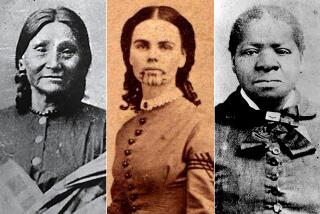Rival Old West Historians Try to Put Own Brand on Frontier
- Share via
A scholarly dust-up among academic historians over the history of the American West is turning nasty, with one respected senior professor likening his younger colleagues to Stalinists and Nazi propagandists.
The decidedly un-collegial charge by Gerald Nash of the University of New Mexico has set off a chain of recrimination and gossip among Western historians.
The Western history field has been invigorated in recent years by a much-publicized revisionist movement. So-called New Western historians have been loudly debunking the old myths of the frontier, substituting a bleaker tale of rapaciousness and greed.
In the process, they have annoyed some older historians, who have accused the younger scholars of grandstanding, self-promotion and claiming credit for others’ ideas.
At the heart of the matter is the traditional view that the westward movement of the frontier uniquely shaped American democracy and character.
The New Western historians reject the notion of a frontier altogether in favor of a more complex story--of Mexicans moving northward, Asians eastward and Anglos westward, converging on Native American land.
Where earlier historians saw the triumphant spread of civilization, the New Western historians see the oppression of native peoples. In addition to heroic individualism, they see the federal government’s heavy hand.
In the January issue of the Journal of the West, Nash, a former refugee from Nazi Germany, accused the New Western historians of taking an overly grim view and engaging not in revisionism but in propaganda.
Their emphasis on race, he suggested, is reminiscent of Nazism; their attention to the shortcomings of capitalism reminiscent of Stalin. He accused them of hewing to a party line and censoring divergent views.
“I’m not saying we should romanticize our past,” Nash insisted in a telephone interview. “But I am saying that a realistic view of the human experience has both positive and negative aspects.”
Copies of the article have been circulating among historians. Some say they are appalled.
“Pay no attention to that idiocy,” said Patricia Limerick, the best known of the New Western historians. She said the article reminded her of incidents “in small towns, when somebody becomes peculiar and starts saying irrational things.”
“There are rhetorical charges in there which I think are deplorable and unverifiable,” said John Mack Faragher of Mt. Holyoke College. “There are also serious charges impugning the scholarship of unnamed people.”
A few historians are taking Nash’s side.
“Those people can dish it out but they can’t take it,” said William H. Goetzmann of the University of Texas. “ . . . Some of us kind of like America. We’re willing to put up tickets to send a couple of these people to Russia.”
William W. Savage Jr. of the University of Oklahoma, a Nash defender, said: “If you don’t deal with stupidity when it comes along, it will grow and turn into something else.”
Meanwhile, some historians see another generational battle brewing--between the New Western historians and a younger group of junior professors who, some believe, are gearing up to begin revising the revisionists.
The two groups clashed last summer at a meeting in Logan, Utah, at which Limerick flamboyantly criticized the younger group as wimps, saying the work they had presented at the conference did not go far enough.
Stung, some of the younger historians fought back. The audience seemed to grow uncomfortable with the rancor, one participant recalled. Limerick, a professor at the University of Colorado, now says she went too far.
“I probably screwed up,” she said in a recent interview. “ . . . I think I was unnecessarily insulting.”
Western historians like to say that the current “dialogue” is healthy and good for the field. The conflict, they say, should not be overstated. But some also confess they are concerned.
“Because people really do get angry and they do get hurt and some will get fed up,” one anonymous historian said. “They’ll go into intellectual exile. They’ll get mad and go away.”
More to Read
Sign up for Essential California
The most important California stories and recommendations in your inbox every morning.
You may occasionally receive promotional content from the Los Angeles Times.













